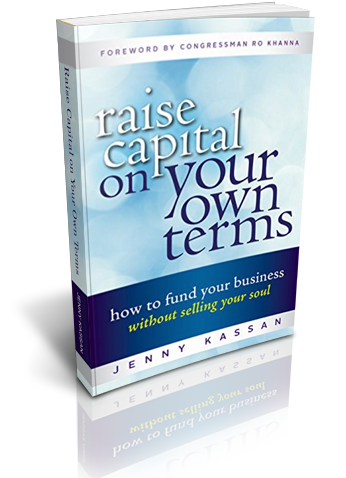 Did you know that small businesses make up 97% of all private-sector companies in the U.S.? What’s more, according to research conducted by the SBA government agency, they employ half of all employees in the entire private sector. That means that half the people in the United States who don’t work for a public agency are employed by a small business.
Did you know that small businesses make up 97% of all private-sector companies in the U.S.? What’s more, according to research conducted by the SBA government agency, they employ half of all employees in the entire private sector. That means that half the people in the United States who don’t work for a public agency are employed by a small business.
The challenges of small businesses affect us all. And arguably the biggest challenge of small business is raising capital.
Most small businesses can’t rely on profits to build their business, both initially and when trying to take the business to the next level. However, owners often shy away from seeking outside funding, having heard horror stories about bringing in outside investors.
You may have heard the story of how the founders of Ben and Jerry’s Homemade Ice Cream lost control of their company. There are numerous such stories of mission-driven, idealistic founders who, through the process of raising capital, lost control of their companies and saw them shed many of the things that made them great. It’s stories like these that make many small business owners hesitant to raise money.
Jenny Kassan, author of Raise Capital on Your Own Terms, says you don’t have to sell your soul to fund your small business. There are many options for raising capital that most small business owners do not consider.
Most people think about venture capitalists, angel investors and other professional investors. However, in 2012, the federal government increased the legal options to facilitate crowd funding and other individual sources. Now almost anyone is a potential investor – your family, friends, and even individuals you don’t know.
Seeking outside funding is not the right answer for every small business, but according to Kassan, these common fears should not be a reason to hold you back from raising capital.
| Fear | Rational Response |
|---|---|
| Who am I to ask someone to invest in my business? | My business brings value to the world. If I don’t grow my business, I won't be able to serve all the people who would benefit. The right investor(s) will see the value of that and will be excited to support me. |
| What if I lose their money? | Everyone who invests knows there is a risk. I will do whatever it takes to make the business successful. If things don’t work out, my investors will know I did the best I could. |
| I’ll be stressed all the time about whether the investors will get what I promised. | Having investors will help me stay focused. Also I’ll have a built in source of support when I need advice or resources. |
| I can't look for investors until I fix my website. | If I wait to raise money until everything in my business is perfect, I’ll never start. What if what I have now is good enough to start? |
| I don't have time for this. | Without investment, I can’t take my business where I want it to go. Raising capital is a great growth opportunity. |
If you are interested in raising capital, I recommend Raise Capital on Your Own Terms, a new book that provides a detailed guide for every step you need to take, including how to find the right investors and how to structure your agreement to protect what is most important to you.
 Jenny Kassan takes you through a six-step process for creating a customized capital-raising plan: one that excites you and is in complete agreement with your business goals and your personal values. Kassan knows the landscape of investment capital, and what she is talking about goes way beyond crowdfunding. There are all kinds of investors out there, with varying motives and expectations. They’re not all looking to make a killing—many investors are mission-driven. Kassan shows you how to find them, and provides a layperson’s primer on the laws and regulations governing fundraising.
Jenny Kassan takes you through a six-step process for creating a customized capital-raising plan: one that excites you and is in complete agreement with your business goals and your personal values. Kassan knows the landscape of investment capital, and what she is talking about goes way beyond crowdfunding. There are all kinds of investors out there, with varying motives and expectations. They’re not all looking to make a killing—many investors are mission-driven. Kassan shows you how to find them, and provides a layperson’s primer on the laws and regulations governing fundraising.













Great blog – very informative. As someone who works with many entrepreneurs, this blog addresses one of the key challenges of growth!
Indeed! Quite a challenge. Many turn to personal resources – use personal credit, get loans from family members, etc. There are resources available but many don’t know how to access them or who to trust and so end up making not well-informed decisions.
Dear Jesse,
All wonderful points but there is an alternative that has financed businesses by the millions. Do you ever wonder why in many towns and cities virtually every convenience store, gas station, uber car, low end motel, landscaping service and many restaurants are owned by immigrants? A group of graduate students and I have been studying how immigrants fund their businesses in Nepali, Indian, Bangladeshi, Mexican, Eritren, Caribbean, Cambodian, Kenyan and Congolese communities. Bringing traditions from their home countries a group of trusted friends join together in a savings circle. Each contributes a few hundred up to one thousand dollars every month into a pool. By lot or in pre arranged each member in turn receives a payout of a few thousand up to one hundred thousand dollars to launch a business with the advice and support of the others in the group. Often smaller groups of four or five join together to jointly start a business. Might we learn from immigrants how to capitalize business start ups? The key is disciplined savings, a bit of patience to wait your turn along with mutual accountability and support.
Jeff
Jeff Ashe
Another excellent approach! Your book In Their Own Hands: How Savings Groups Are Revolutionizing Development is informative and inspiring (also published by Berrett-Koehler)
Once again, you offer such valuable insights. What is fascinating is that Congress focuses on capital gains which frankly, few small businesses have. USA TODAY reported that 30% of small
business owners don’t take a salary. We put it right back into the business. And if our small business practice is a consultancy, we don’t always have tangible assets but rather intellectual property which may or may not be of interest to traditional investors. I’ll check out her book!
Lots of great thoughts, Eileen. I think investors are interested in tech IP, and it might be possible to interest them in other types. Definitely worth checking out how to engage non-traditional investors. I think there are creative ways to raise funds for a consultancy practice. Good luck!
The strategies I recommend in my book don’t require any IP. The first time I raised money for my own business it was for a consultancy. You can do it!